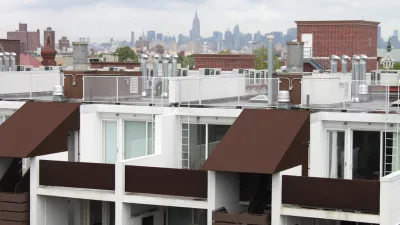Two authors agree that housing policies in the War on Poverty have failed. Are those policies too progressive, or not progressive enough?

Earlier this month, progressive Maya Dukasmova provided a critique of the "liberal establishment’s" well-intentioned but circular and racist housing policies designed to address urban poverty.
"When we blame 'concentrated poverty' for the diminished quality of life in minority neighborhoods, we are confusing that which creates poverty (namely racist policies and practices) and the conditions created by it..housing mobility efforts, while beneficial for some individuals, only affirm the notion that there is something inherently wrong with black communities..."
Free-market enthusiast Emily Washington responded with her own interpretation of the causes of failure. While Washington agrees that government efforts to "achieve the 'correct' mix of income diversification" are ill-conceived, she blames progressives. "In fact, the programs that she [Dukasmova] criticizes directly grew out of progressive scholarship and politics."
While both writers point to the seminal work of photographer Joseph Riis’ documentation of living conditions in New York City’s 19th-century tenement housing, they disagree on the political repercussions of his influence.
Dukasmova: "In the decades after it first glimpsed this urban poverty in Riis’s photographs, the establishment watched as metropolitan areas around the country grew ever more segregated…Part of the liberal establishment’s failure to address this problem stems from its inability to embrace truly progressive understandings of poverty."
Washington: "Jacob Riis’ influential work...fueled a progressive movement to eradicate tenement housing, with activists motivated both by altruism toward the poor and by a fear of disease and cultural changes that immigrant-dominated neighborhoods brought."
Dukasmova believes that a truly progressive policy would reframe the conditions of the urban poor in terms of the impact of "concentrated power, concentrated whiteness, and concentrated wealth." Washington has a very specific policy recommendation: she believes that unconditional cash transfers to the urban poor would be more effective than government-engineered mobility because unconditional transfers "do not disrespect the autonomy and ability of people of all income levels to make decisions that benefit their own interest."
FULL STORY: The history of progressive housing policy

Analysis: Cybertruck Fatality Rate Far Exceeds That of Ford Pinto
The Tesla Cybertruck was recalled seven times last year.

National Parks Layoffs Will Cause Communities to Lose Billions
Thousands of essential park workers were laid off this week, just before the busy spring break season.

Retro-silient?: America’s First “Eco-burb,” The Woodlands Turns 50
A master-planned community north of Houston offers lessons on green infrastructure and resilient design, but falls short of its founder’s lofty affordability and walkability goals.

Test News Post 1
This is a summary

Analysis: Cybertruck Fatality Rate Far Exceeds That of Ford Pinto
The Tesla Cybertruck was recalled seven times last year.

Test News Headline 46
Test for the image on the front page.
Urban Design for Planners 1: Software Tools
This six-course series explores essential urban design concepts using open source software and equips planners with the tools they need to participate fully in the urban design process.
Planning for Universal Design
Learn the tools for implementing Universal Design in planning regulations.
EMC Planning Group, Inc.
Planetizen
Planetizen
Mpact (formerly Rail~Volution)
Great Falls Development Authority, Inc.
HUDs Office of Policy Development and Research
NYU Wagner Graduate School of Public Service




























